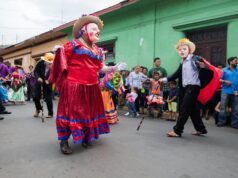Almost daily on social media pages about visiting Nicaragua you will see questions regarding a visa to enter Nicaragua, visa renewals or visa extensions.
In reality, most visitors don’t need a visa to enter Nicaragua as they will be “Visa Exempt”. What you will get is a “90 day stay” and a stamp in your passport showing that you are legally entitled to be here for the period stated. The USA, Canada, Australia, New Zealand, Great Britain, the EU, most of South America, Russia, and many other countries fall under the visa exempt category. Check your nationality and visa requirement here.
(This Nica-Biz article; Immigration Rules for Entering Nicaragua has more information about the Category B and C Visas for citizens of those countries that require a visa to enter Nicaragua issued prior to travel or by way of a border application.)
90 Day Stay
The 90 day stay is granted by way of a reciprocal agreement between Nicaragua and those countries offering similar, minimal (non-visa) requirements at the time of entering their borders. (General Law of Migration and Foreigners; Chapter II, Article 22, Paragraph 1).
Exceptionally, additional documentation may be requested by Migración. (Article 63 number 7 of the Regulation to Law 761, General Law of Migración and Foreigners). This can include; proof of return ticket or onward travel, proof that you are solvent (have enough money for your stay) or any other requests or inquiries in order to satisfy themselves of your immigration clearance.
Extension of your 90 day stay
The Extension of Stay is permitted by the General Law of Migration and Foreigners; Chapter II, Article 22, Paragraph 2.
Currently, if you wish to stay longer than your 90 day stamp, you will need to visit either the main Migración office in Managua or one of the departmental offices known as SERTRAMIS. Nicaragua is divided up into 15 departments (departamentos) and two self-governing “autonomous regions”.
Interactive Map showing Departmental Migración Offices (Servicios de Trámites Migratorios-SERTRAMIS)
Note: The extension of stay is not available at the two Migración shopping mall locations shown on the map at Plaza Las Américas and Metrocentro in Managua.
You need to apply for your extension before the original 90 days expire, but only a day or two before. In Spanish and in Migración speak it’s a “Prórroga de estancia para extranjeros no residentes” or in English; an extension of stay for non-resident foreigners. This is where it’s a good thing not to confuse the issue and start talking about visas but instead stick to the abbreviated version of “Prórroga de estancia” (Extension of Stay).
You will have to pay for and complete the form “Formulario de solicitud de prórroga”, have photocopies of your passport data page and last stamp as well as make the payment and show the receipt.
The difference between going to Migración HQ in Managua and a departmental office is that in Managua you can wait for the service whereas at a departmental office you will leave your passport with them and they send it to Managua. It takes about week to get it back (they call you when it is).
As of the date of posting this article, each “in-country” extension is limited to only 30 days and the fee for the extension (from one to thirty days) is currently US $25.00 (it was increased from $500 Córdobas and dollarized as of August 2020).
Pre-Covid, one extension of stay could be obtained “in-country” for an additional 90 days, after which you would be required to leave the country.
That was a relatively simple procedure of crossing over into Costa Rica, turning round and coming back through the Migración process and getting a new 90 day stay. It can still be done, however, it makes no financial sense.
To enter Costa Rica, you are required to have the minimum 5 days insurance cover, complete the on-line HEALTH PASS information and have the usual negative PCR RT for Covid-19 to re-enter Nicaragua.
By the time you have added the border fees and transport, you will have spent a minimum of US $240 for 90 days instead of 3 x in-country extensions for less than US $90.
Note: As of August 1st 2021, if you are under 18 or over 18 and fully vaccinated against Covid-19, you may be exempt from the Costa Rica insurance requirement, depending on which vaccine you were given.
Moving to Nicaragua
Lastly, I also see a lot of posts that start; “We are moving to Nicaragua to live”. My advice is to get as much as possible done on your residency documents before you get here and then make it a priority to submit that residency application as soon as you can.
The reason being; while you are here finishing putting your application together, and even while you are “in process” (with the slip of paper proving that), the Migración law requires that you remain in a legal status for as long as it takes to get approved. That means following the extension of stay rules outlines above or leaving the country and coming back in.







